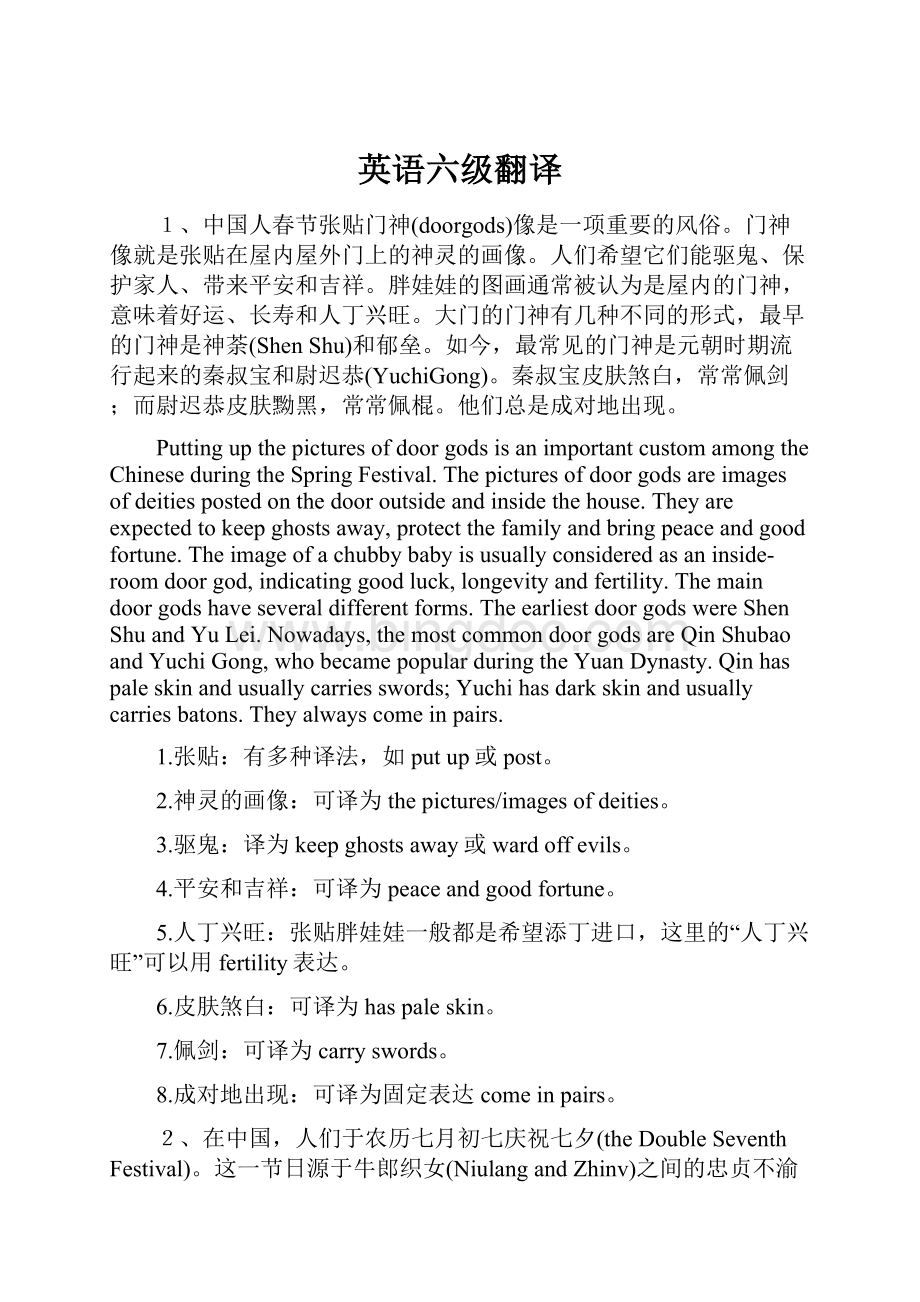英语六级翻译Word文档下载推荐.docx
《英语六级翻译Word文档下载推荐.docx》由会员分享,可在线阅读,更多相关《英语六级翻译Word文档下载推荐.docx(13页珍藏版)》请在冰点文库上搜索。

可译为peaceandgoodfortune。
5.人丁兴旺:
张贴胖娃娃一般都是希望添丁进口,这里的“人丁兴旺”可以用fertility表达。
6.皮肤煞白:
可译为haspaleskin。
7.佩剑:
可译为carryswords。
8.成对地出现:
可译为固定表达comeinpairs。
2、在中国,人们于农历七月初七庆祝七夕(theDoubleSeventhFestival)。
这一节日源于牛郎织女(NiulangandZhinv)之间的忠贞不渝的爱情故事。
七夕节那天,姑娘们向天上的女神祈求聪慧的心灵和针线技巧。
中国古代有各种考验智慧的民间习俗。
宫女们也非常重视这些活动,而这些活动通常受到皇帝支持。
在七夕浪漫之夜,姑娘们准备瓜果和时令食物,祈求技艺和美满姻缘。
作为中国的情人节,七夕是中国所有传统节日中最浪漫的。
如今,在基于传统文化的节日中,七夕仍是最受喜爱的节日之一。
InChina,peoplecelebratetheDoubleSeventhFestivalontheseventhdayoflunarJuly.ThefestivalspringsfromthelegendoftheloyallovebetweenNiulangandZhinv.Onthefestival,girlsbegforasmartheartandknittingandneedlecraftskillsfromthegoddessinheaven.TherearevariousfolkcustomsofingenuitytestsinancientChina.Andthemaidsinthepalacealsopaidgreatattentiontotheactivities,whichwereusuallysupportedbytheemperor.Ontheromanticevening,girlspreparemelons,fruitsandseasonalfoodsprayingforskillsandagoodmarriage.AsChina'
sValentine'
sDay,theDoubleSeventhFestivalisthemostromanticoneamongalltraditionalChinesefestivals.Today,itisstilloneofPeople'
sfavoritefestivalsbasedonthetraditionalculture.
1.七月初七:
即一年中“第七个月的第七天”可译为theseventhdayoftheseventhmonth。
2.源于;
即“起源于”可译为springfrom或originatefrom。
3.忠贞不渝的爱情;
可译为loyallove。
4.聪慧的心灵:
可译为abrightheart,,也可用asmartheart表达。
5.针线技巧:
可译为knittingandneedlecraftskills。
其中knitting意为“针织”,needlecraft意为“刺绣或编织技巧”。
6.重视:
可译为payattentionto。
Attention前可以加形容词修饰。
比知greatattention等,表示“非常重视”,相反,lessattention则是“不怎么重视”。
7.美满姻缘:
即“好姻缘"
,可译为goodmarriage。
3、泼水节(theWater-SplashingFestival)是傣族(theDaiminority)最隆重的传统节日。
泼水节一般于公历四月中旬开始,持续3-7天。
在傣族的历法中,泼水节就是新年。
在云南省众多的少数民族节日中,泼水节影响力最大、参与人数最多。
泼水节这一天,傣族人盛装打扮,带着清水到佛寺。
他们首先为大佛(Buddha)沐浴,接着开始互相泼水,以此带来好运、快乐和健康。
你被泼的水越多,你得到的幸运将越多,你的生活将越幸福。
傣族人也邀请其他少数民族和游客共同庆祝泼水节。
TheWater-SplashingFestivalisthemostceremonioustraditionalfestivaloftheDaiminority.Itusuallybeginsinmid-Aprilofthesolarcalendar,lastingthreetosevendays.TheWater-SplashingFestivalistheNewYearontheDaicalendar,andalsoafestivalwiththelargestinfluenceandmaximumparticipatingpopulationamonglotsofminorityfestivalsinYunnanProvince.Duringthisfestival,DaiPeoplewillgetdressedupandcarrycleanwatertotheBuddhisttemple.TheywillfirsttakeashowerfortheBuddhaandthenbegintosplashwaterwitheachotherforbringinggoodluck,joyandhealth.Themorewateryouaresplashed,themoreluckyouwillhave,andthehappieryouwillbe.DaiPeoplewillalsoinvitepeoplefromotherminoritynationalityandtouriststocelebratethefestivaltogether.
1.最隆重的传统节日:
“隆重的”译为ceremonious,“传统节日”译为traditionalfestival,故“最隆重的传统节曰”即themostceremonioustraditionalfestival。
2.公历四月中旬:
“公历”即solarcalendar,“中旬”可用mid-表示,故“公历四月中旬”可译为mid-Aprilofthesolarcalendar。
3.影响力最大、参与人数最多:
可译为withthelargestinfluenceandmaximumparticipatingpopulation,作festival的后置定语。
4.盛装打扮:
dressup本身就有“盛装打扮”的意思,“盛装”无需重译。
5.为大佛沐浴:
“为…沐浴”可译为takeashowerfor...;
“大佛”即theBuddha。
6.带来好运:
即bringgoodluck。
该词组在有关中国文化的文章中经常出现,因为绝大部分的中国文化习俗等都是为了给人带来好运。
7.越来越:
可用固定句式themore...themore...表达。
4、小年(theLittleNewYear)比农历新年早一个星期,也称祭灶节(theKitchenGodFestival)。
灶神监察家家户户的道德品质。
春节最特别的传统,就是小年时烧一张灶神(KitchenGod)像,送灶神的灵魂上天汇报这个家庭过去一年中的作为。
之后,人们在火炉旁张贴新的灶神像,迎接灶神归来。
接下来一年,灶神会监督并保护这家人。
由于灶神和农历新年有密切联系,使得灶神节被称为小年。
现在尽管在小年这天祭祀灶神的家庭少了,但是很多传统节日活动仍然很流行。
TheLittleNewYear,whichfallsaboutaweekbeforetheLunarNewYear,isalsoknownastheKitchenGodFestival.TheKitchenGodoverseesthemoraltraitofeachhousehold.AsoneofthemostspecialtraditionsoftheSpringFestival,apaperimageoftheKitchenGodisburnedonLittleNewYear,dispatchingthegod'
sspirittoHeaventoreportonthefamily'
sconductoverthepastyear.TheKitchenGodisthenwelcomedbackbypastinganewpaperimageofhimbesidethestove.ThentheKitchenGodwilloverseeandprotectthehouseholdinthefollowingyear.ThecloseassociationoftheKitchenGodwiththeLunarNewYearhasresultedintheKitchenGodFestivalbeingcalledtheLittleNewYear.AlthoughveryfewfamiliesstillmakesacrificestotheKitchenGodonthisday,manytraditionalfestivalactivitiesarestillverypopular.
1.监察:
使用oversee一词来表达,意为监督,审查。
2.家家户户:
可译为eachhousehold。
3.灶神像:
可译为apaperimageoftheKitchenGod。
4.使得...:
可译为resultin,也可译为leadto。
5.祭祀:
可译为makesacrifices或offersacrifices。
6.传统节日活动:
即traditionalfestivalactivities。
5、每年的农历九月初九是中国的传统节日重阳节(theDoubleNinthFestival)。
重阳节有2000多年的历史,早在唐朝时期就正式被定为民间节日。
皇帝和百姓,都根据礼仪和风俗庆祝重阳节。
随着时间的流逝,重阳节逐渐形成一些庆祝习俗,如出游、登高、插茱萸(cornel)。
重阳节那天,全家人通常一起庆祝节日,而离家的人则会倍加思乡。
汉族的传统观念认为,数字9代表健康长寿,因此中国政府于1989年将农历九月初九定为“老人节。
September9thonlunarcalendaristheDoubleNinthFestivaleveryyear,atraditionalfestivalofChina.Withahistoryofmorethan2,000years,theDoubleNinthFestivalwasformallysetdownasafolkfestivalasearlyastheTangDynasty;
andboththeemperorsandciviliansalikecelebratedthefestivalfollowingtheriteandcustoms.Astimegoesby,theDoubleNinthFestivalhasgraduallyformedthecelebratingconventionsofgoingonajourney,climbingandwearingcornels.Onthatday,thewholefamilywillalwaysgathertospendthefestivaltogether,whilethosefarfromtheirhomeswillbecomemorehomesick.Asthefigure“9”representslongevityandhealthinthetraditionalconceptofHanpeople,theChinesegovernmentsetSeptember9thonlunarcalendaras“theSeniors'
Day”in1989.
1.农历九月初九:
可译为September9thonlunarcalendar。
2.被定为:
可译为besetdown。
3.随着时间的流逝:
可译为astimegoesby或astimeelapses。
4.形成一些庆祝习俗:
可译为formthecelebratingconventionsof…其中conventions意为“习俗”。
5.登高:
可译为ascendingaheight。
6.倍加思乡:
“思乡”译为homesick;
“倍加思乡”译为比较级morehomesick。
7.汉族:
此处指的是“汉族人”,译为Hanpeople。
6、清明节(theTomb-SweepingDay),又称“寒食节”,是中国人祭祀祖先最重要的节日。
清明节源于周朝,有2000多年的历史。
清明是中国24节气(24solarterms)之一,它预示着春天的来I寒食节是人们为祖先扫墓、吃冷食的节日。
清明与寒食节相连,因此二者后来渐渐地成为一个节日,扫墓和吃冷食成了清明的习俗。
清明成了富有文化含义、意义重大的纪念节日。
从古时起,就有很多有关清明的艺术作品和诗作。
其中,唐代诗人杜牧写的《清明》家喻户晓。
TheTomb-SweepingDay,alsoknownas“ColdFoodFestival'
isthemostimportantfestivalforChinesepeopletooffersacrificestoancestors.ItsprangfromtheZhouDynasty,withahistoryofover2,000years.Qingmingisoneofthe24solartermsinChina,showingthecomingofspring.ColdFoodFestivalisadaywhenpeoplesweeptheancestors'
tombsandeatcoldfood.QingmingwasclosetoColdFoodFestival,solaterontheygraduallybecameonefestival,andsweepingtombsandeatingcoldfoodturnedintothecustomsofQingming.Qingminghasevolvedintoaculture-richandmeaningfulremembranceday.Sincetheancienttimes,therehavebeenalotofworksofartandpoemsaboutQingming.Ofthese,theTomb-SweepingDaycomposedbythepoetDuMuintheTangDynastyisahouseholdname.
1.祭祀祖先:
即“给祖先供奉祭品”,故译为offersacrifices['
sæ
krɪfaɪs]toancestors['
æ
nsestə(r)]。
其中sacrifice意为“祭品”。
2.扫墓:
sweeptombs。
3.与...相连:
表达“在时间上相连”,可译为becloseto。
4.成了:
这里暗含“不断进化”的意思,故可译为evolveinto。
5.富有文化含义的:
可译为culture-rich。
rich还可与其他名词构成合成词,表示“富有……的”。
6.纪念节日:
可译为remembranceday。
7.家喻户晓:
可译为固定表达ahouseholdname,或译为bewidelyknown。
7、每逢新春佳节,吃饺子(dumplings)已经成为中国的习俗。
究其原因,首先是因为饺子形如金元宝(goldingot),人们在春节吃饺子取“招财进宝"
之意;
二是饺子有馅,便于人们把各种吉祥的东西包到馅里,以寄托人们对新的一年的祈望。
人们常常将花生、枣和栗子等包进焰里。
吃到花生的人将健康长寿,吃到枣和栗子的人将早生贵子。
饺子因所包的馅和制作方法不同而种类繁多。
即使是同一种水饺,亦有不同的吃法。
It'
saChinesecustomtoeatdumplingsduringtheSpringFestival.Thefirstreasonforitisthatdumplingsareshapedlikegoldingots.PeopleeatdumplingsduringtheSpringFestival,wishingtobringinwealthandtreasures.Thesecondreasonisthatdumplingsarestuffedwithfillings,allowingpeopletoputavarietyofluckythingsintoit,andinthiswaypeoplepintheirhopesforthenextyear.Peopleoftenputpeanuts,Chinesedatesandchestnutsinsidethedumplings.Thosewhoeatpeanutswillbehealthyandlivealonglife;
thosewhoeatChinesedatesandchestnutswillhaveababysoon.Thereareawidevarietyofdumplingsduetotheirdiversefillingsinsideanddifferentmethodsofmaking.Evendumplingsofthesamekindhavedifferentwaysofeating.
1.每逢新春值节:
可译为duringtheSpringFestival。
2.饺子形如金元宝:
其中的“形如”可浲为beshapedike;
此句也可译为dumplingslooklikegoldingots。
3.取“招财进宝”之意:
可译为wishingtobringinwealthandtreasures。
其中wishing是非谓语形式作目的状语,表示“人们在春节吃饺子是希望能‘招财进宝”的含义。
4.以寄托人们吋新的一年的祈望:
可译为inthiswaypeoplepiniheirhopesforthencxiyear.
5.吃到枣和栗子的人将早生贵子:
可译为thosewhoeatChinesedatesandchestnutswillhaveababysoon。
“早生贵子”可译为haveababysoon。
人民大会堂GreatHallofthePeople
故宫博物馆ImperialPalaceMuseum
昆曲 Kunqu opera
8、中国人对玉(jade)—向有着特殊的尊爱之情,从而延伸发展出一种优秀而古老的玉石文化。
作为配饰供人赏玩是玉器的原始功能之一,也是玉器最广泛的一种用途。
玉器作为一种文物,它也是历史的见证,有着不可复制的唯一性,更为当今世人所器重。
玉器从一种美化生活的装饰品,到简单的生产工具,然后被融入各种礼节(ritual)内容,被人格化、道德化,继而被看成是财富的象征、宗教图腾(totem)的崇拜……这些无不反映出中国传统文化和中华民族爱玉的心理。
Chinesepeoplea